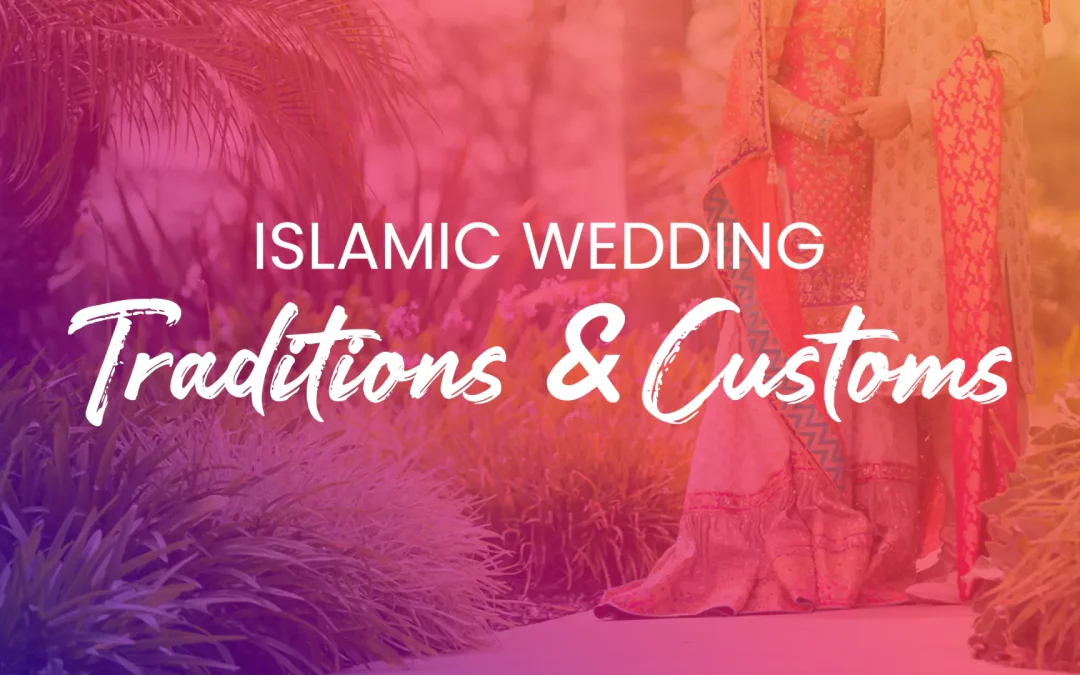Marriage is one of the central tenets of any religion’s culture. It commemorates the establishment of a new connection between two souls and their families. Which would eventually result in the preservation of their culture and religion as their family grew. Muslim weddings and Islamic wedding traditions feature a wealth of wonderful customs and rituals. Typically, marriages are fall into three categories; Pre-wedding, wedding, and post-wedding rituals.
The Muslim wedding ceremony, despite sounding quite formal, is one of the most exciting and vibrant weddings in the world. The Nikkah ceremony and subsequent Walima reception are two of the traditional elements of an Islamic wedding.
Muslims residing in different areas of the world have different customs and traditions. Which include engagement, manjha (mayoun or haldi), mehndi (Henna function), Baraat (Nikkah), Rukhsati and Walima (the reception). But some other Islamic wedding traditions and customs you are sure to see in a Muslim Wedding are:
Mehr
The Mehr is a required formality in Muslim weddings, in contrast to dowry. Which is is an antiquated custom and given by the bride’s family. This might be cash or gold. which only the bride will use.
Vows
The marriage vows are a distinctive feature of Muslim weddings. The Imam reads these oaths.
Khutba-e-Nikkah
The Imam or the individual who read the Nikah delivered this brief sermon. This sermon explains the significance of Nikah and how people should observe it.
A wall between male sitting and female sitting
This division keeps men and women in separate areas. Since women must don a veil from na-mehram to comply with Islamic law (males other than her spouse, brother, and father.)
These were the typical elements present in each Muslim wedding. Now we are going to talk about real Islamic wedding traditions and customs including our settled wedding traditions and customs.
Islamic wedding traditions and customs
The actual Muslim wedding, or nikkah, is performed orally by repeating the word “yes” (Qabool hai) three times. The purpose of this verbal yes is to get the consent of both parties. After saying “yes,” the bride and groom are given official documents to sign, seal, and make official, along with the bride’s Mahr (money given to the bride as her own and she may use or keep as she wishes).
In Islam, there is no rule which says the groom and his family should have a meal with the parents of the bride. It depends on the bride’s family if they want to feed them or not but pleasing the groom and his family with a meal is a gesture to give them honour.
After Nikkah, the next step is Rukhasti which is the departure of the bride with her spouse. The instant Rukhsati or delayed Rukhasti both are valid. It depends on Bride’s choice.
The wedding reception, or Walima, is held the following day as a way for the groom to celebrate his Nikkah with his friends and families.
Wedding traditions and customs set by Us
Modern Muslims have modern ways of celebrating weddings. The standards are becoming higher day by day to set a wedding. People in the race of pretending more and more are wasting millions of rupees on unnecessary functions. People in the community are competing with money not knowing what damage they are causing to our middle-class people. They have included functions just to show off their money and to tell how happy they are to wed their son or daughter.
The modern definition of a high-class wedding includes loud music, fireworks, and a mix of male and female guests.
Unnecessary celebrations like the bridal shower, barat, reception, henna, mayun, qawwali night, engagement, and joota chupai (hiding of shoes) are starting to become a part of our traditions. But keep in mind that they are not part of our Islamic wedding customs.
Our Islamic wedding tradition is to organise a pure wedding so the bride can say bye in peace and tranquillity. But our functions are becoming noisy with music, dancing, and firing guns. These ceremonies not only affect our environment but also the beautiful minds of our people. After seeing these functions, everyone is dressing to do the same, not caring if their pocket is permitting it or not. These functions are nothing but a waste of money, time, and the production of envious feelings.
Wrapping Up
Muslim weddings are filled with magnificent and interesting traditions and rituals. Muslims have a huge number and live all over the world. As a result, their wedding traditions have been modified and tailored to particular regions. Regardless of the variations, all Muslim weddings adhere to a number of significant traditions. Additionally, you would see the most exquisite wedding attires. Muslim wedding food is so delicious and fragrant that you will still remember it days after the wedding.
Everyone has their ways of enjoying weddings. Some perform weddings in pure Islamic ways and some with Islamic ways amalgamated with societal ways. We’re not here to criticize; rather, we’re here to explain how these rituals affect people. But it is entirely up to you.
As Islam is practiced differently depending on the country. So, in a Muslim wedding, you can anticipate regional influences. However, if this is your first time attending a Muslim wedding, resist the urge to jump on the floor or engage in excessive public intimacy. There are some limitations, and you must abide by them.
Now share your thoughts in the comments.
Which custom is your favorite and why?


sirf nikkah or walima, baqi sab waqt or paisey ka ziyan hai.
Nice traditions
Jazakallah. Islamic wedding customs and rituals are explained in great detail in this comprehensive blog. It also emphasizes the need for moderation and simplicity in celebrations, encouraging a return to the core values of Islamic marriage ceremonies.
Thank you for your valuable comment Talha.